Will Montessori work for my Autistic child?
I have enjoyed following Amorette @french.family.montessori on Instagram. So I was delighted when she agreed to do an interview for the blog. If you’ve ever wondered “will Montessori work for my Autistic child?” or thought about homeschooling or twins, then you are going to love this interview. I love how Montessori families are so different, yet the underlying principles of Montessori can be applied in every family in their unique way.
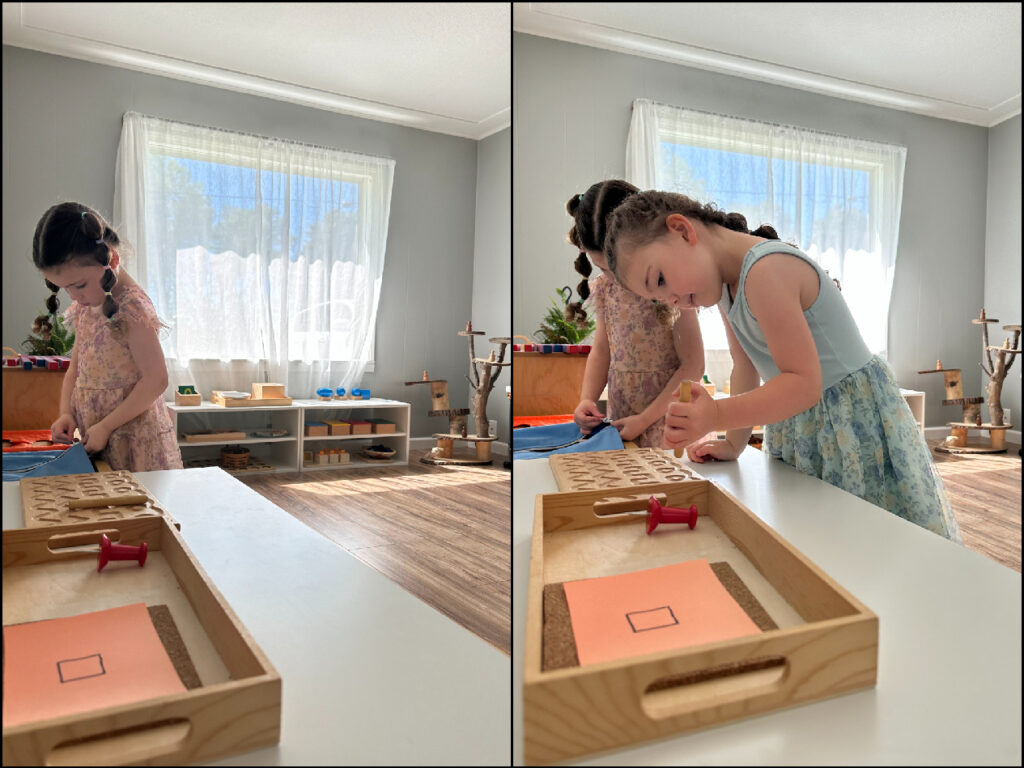
1. Who lives in your home?
Hubby. Myself (Amorette). E and V, 4-year-old identical twins, and a new addition joining our family in March 2024. We also have Kaida, our 9-year-old dog, and Nala, our 12-year-old cat—both are beloved members of the family and offer a great deal of emotional support.
2. What do you find resonates most with you about the Montessori approach?
Accepting everyone the way they are and meeting them where they are at rather than where others believe they should be. There’s respect for all, regardless of age and abilities, and the peace of the environment. There’s also the importance of educating the child as a whole—understanding that their emotional, social, and physical needs require and deserve as much energy and attention as their cognitive.
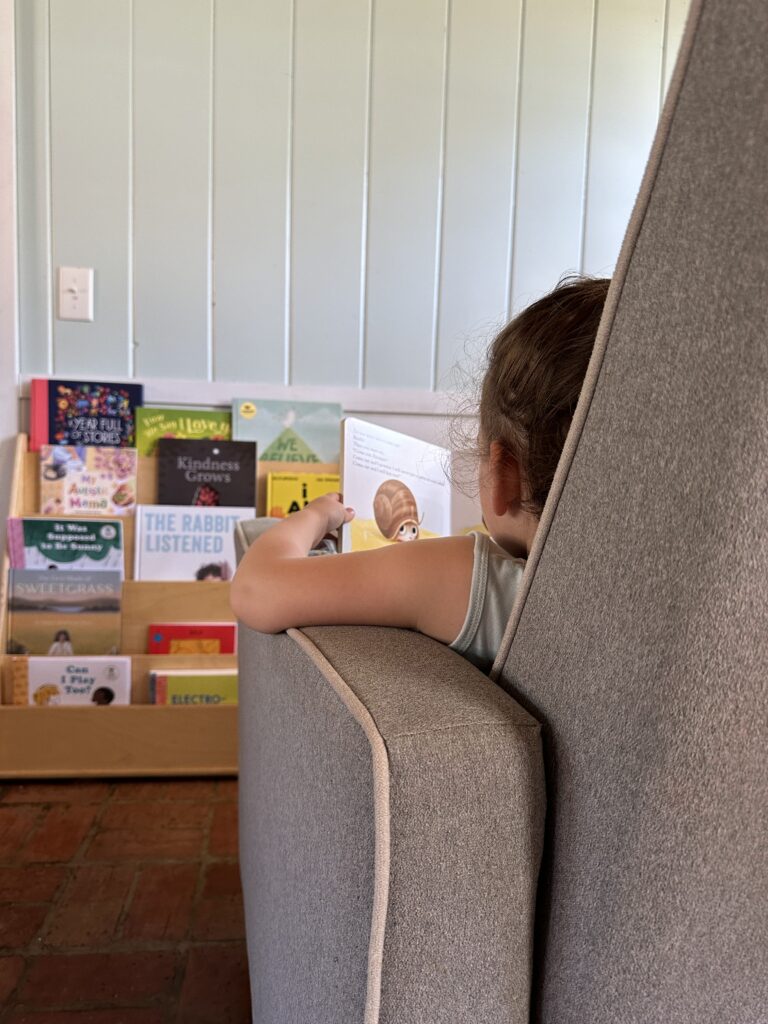
3. What is currently your favourite thing to do at home with your children?
I have a few favourites. Reading, we do a lot of reading and really enjoy that time together and it recharges my little cuddlers love batteries. I also really enjoy just observing them. They both have such a love of dance as well as their newfound interest in open-ended materials and pretend play, which has greatly been evolving over the last two years. Just watching what they come up with brings such joy.
4. How do you set up your home to help apply Montessori at home?
I follow E and V; their interests, current development, sensory needs, and developmental areas that require more attention. It takes a little bit of balance to ensure that everyone gets all their needs met, while also respecting the needs of others, but we make it work for everyone. Creating zones with boundaries has been helpful. For instance, musical instruments stay in the homeschool room, they don’t get brought to other areas of the home to honour another’s need for a quieter space. We provide tools that allow them to succeed, such as a learning tower for cooking, stools and faucet extenders for sinks. We also have furniture and tools—tables, chairs, shelves, wardrobes, mirrors, brooms, mops, etc.—set at their height or their size.
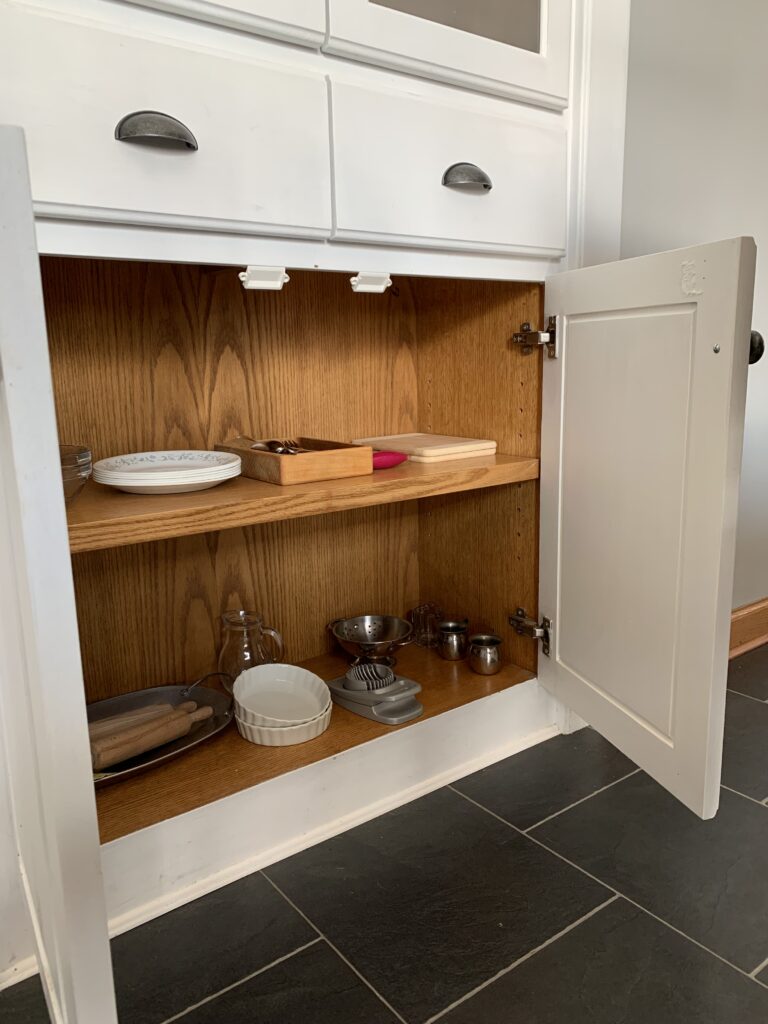
5. As an Autistic person, could you share a small insight into ways that you parent that work for both you and your family?
Lots of preparation and extra attention to details. I don’t just spring change onto them as I can’t handle that myself. As someone who has a lot of specific needs needs I’m able to understand the importance of even the smallest of someone else’s. I get overwhelmed easily and require consistency and a sense of calm in my environment, something that my children benefit greatly from, as well—one of the many things that attracted me to the Montessori Method.
For instance, children thrive from routines, and who knows more about routines and that alterations require plenty of time to prepare than an Autistic? Understanding that great need for emotional regulation. Even the littlest frustration requires as much attention and energy as the larger ones and that it’s just as important to work through them, even if it may seem pointless or that it’s not impactful—it really is.
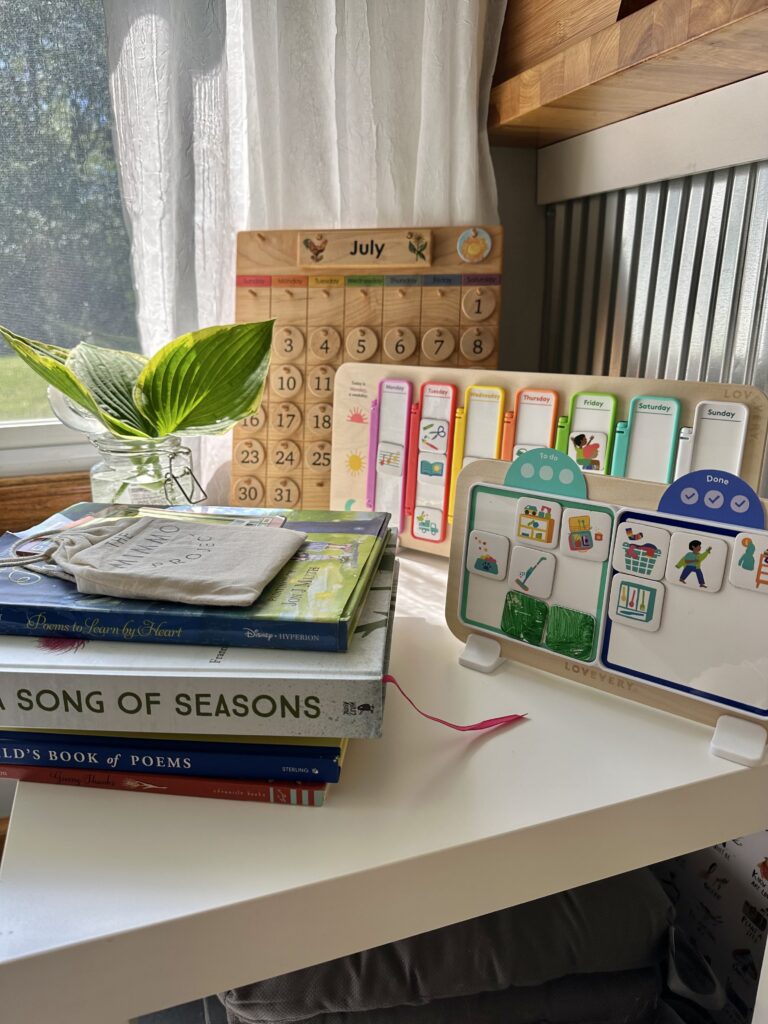
6. What are your favourite twin tips?
Never forget that they are individual people. I find this is the greatest challenge when it comes to others, especially when it comes to identical twins. I’m not sure if it’s the novelty of twins or perhaps that people expect them, or want them, to be carbon copies of each other or maybe it’s easy to forget they are completely separate people when they look so much alike—but they are not the same person.
7. Any special daily or seasonal rhythms or rituals you are enjoying in your family right now?
Our morning basket. This is something we do every weekday morning, gathered around the breakfast table. The purpose is to begin the day with a solid routine of togetherness before we move on to our homeschool room or other activities/events of the day. Our “basket” contains materials that pertain to our homeschool study for that day, poetry, sign language, going over the calendar, talking about upcoming appointments, giving thanks, etc. It’s just a great foundation that we build our day upon. This is a tradition that began when I was homeschooled and the girls and I began implementing it shortly before they turned a year old. It has become a safe place and time to talk about various topics or even give extra attention to certain materials. For instance, they currently prefer to go over the moveable alphabet during this time rather than in their homeschool room.
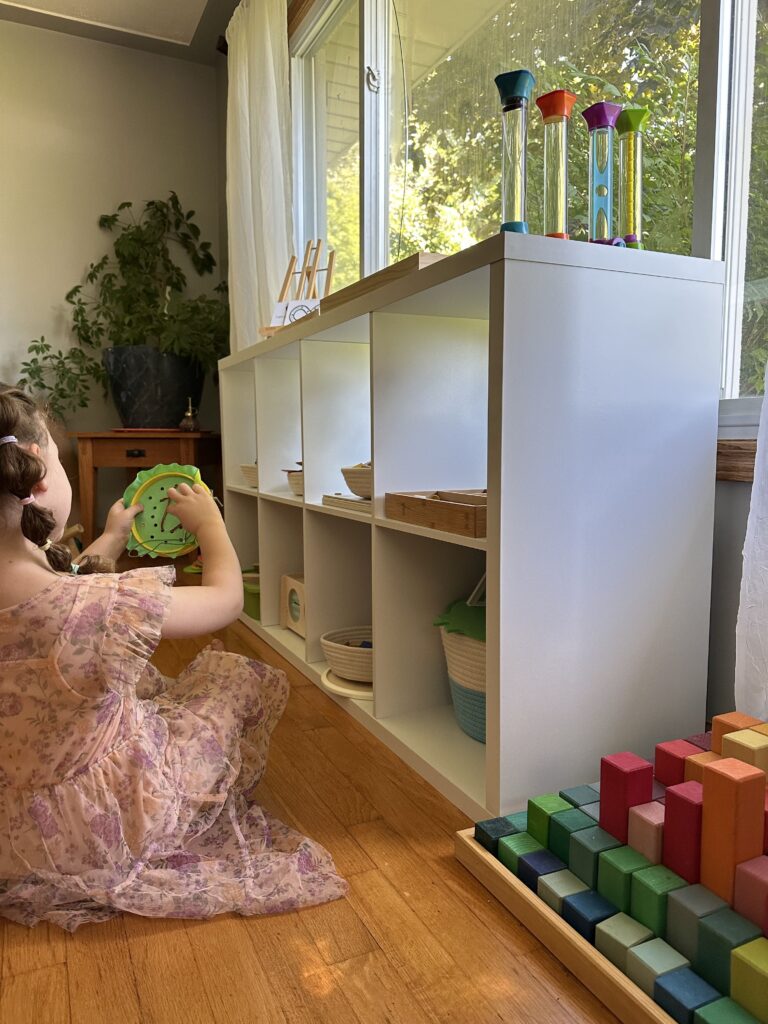
8. Any fun observations as your children transition from the 0-3 years to the 3-6 years?
Their independence. Not only going from toddlers to young children but also from each other and their confidence in themselves. Their drive to accomplish tasks, understand new materials, and their newfound abilities. I never cease to be amazed at how they will be drawn to materials and how diligently they work when they are in a sensitive period for it.
9. Anything else you’d like to share with the readers?
While business marketing and social media may sometimes misrepresent Montessori, never forget why Maria Montessori created the Montessori Method. She created it for us; those who were considered “unteachable”. The first children to attend her Children’s House were poor and/or disabled. Montessori never stopped being for ALL, but too much attention and presence has been given to those who lost touch with the true purpose, or perhaps they never understood it to begin with. I say this because too often questions are asked such as, “Will Montessori work for my Autistic child?” Of course it is! Montessori isn’t all about the materials but more about the philosophy. Following and respecting the child, observing them, fostering their independence, allowing them time, and creating an environment catered to them and their needs.
Never forget the importance of being a prepared adult and continuous growth.

Thank you so much Amorette for sharing your experience. I am sure it will be inspiring and helpful to so many families. Be sure to follow Amorette over on Instagram: @french.family.montessori and at frenchfamilymontessori.com. Amorette also offers:
- 1:1 coaching (DM her for availability)
- “The Autistic Guide—From An Autistic Parent” (use “SIMONE” for $50 off)
- a book for children and caregivers to better help them understand Autistic people: “Hello, I Have Autism (An Autistic Children’s Guide—and for those who care—from an Autistic)“
You may also wish to read Is Montessori for every child?
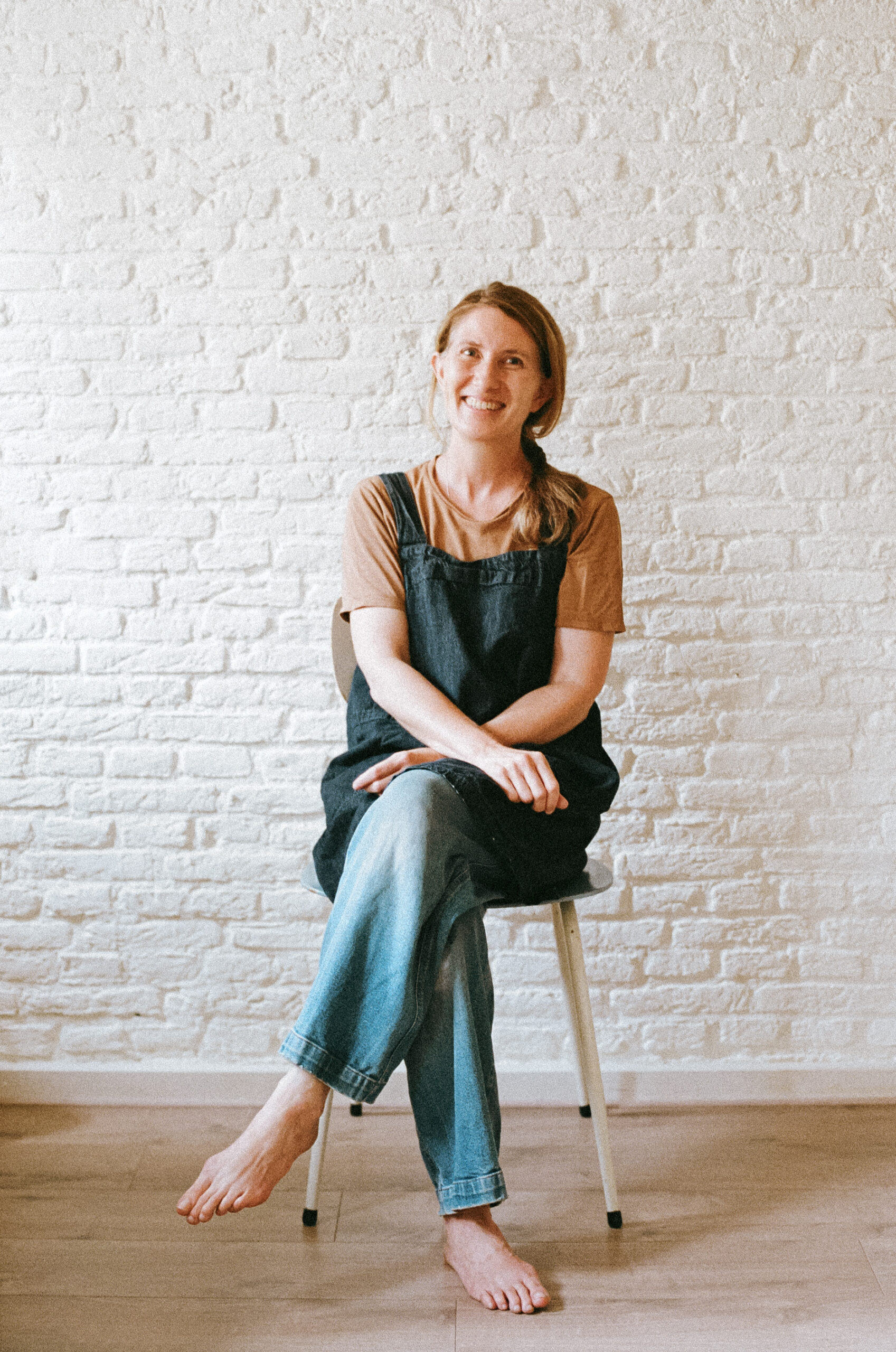
Simone Davies has more than 20 years’ experience as an AMI Montessori educator. Simone is the author of “The Montessori Toddler” and co-author of “The Montessori Baby” and “The Montessori Child” books, comprehensive guides to raising children in a Montessori way. She currently runs parent-child Montessori classes in Amsterdam at her school Jacaranda Tree Montessori. She also has a popular blog, instagram and podcast “The Montessori Notebook” and is mother to two young adults.